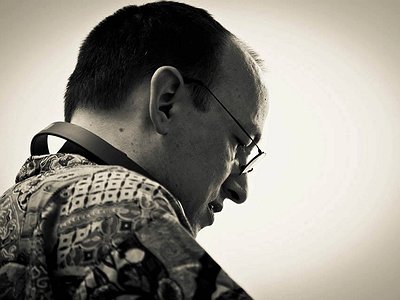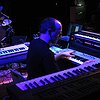Part 1
Name: Michael Brückner
Nationality: German
Occupation: Producer
Musical Recommendations: Attention is love. Every being needs it - and deserves it! Just give it as generously as You can to everyone You meet in life...
If anyone is interested in artists who's work I adore, I invite you to visit my personal Facebook page, where I post about them (almost) on a daily basis.
When did you start writing/producing music - and what or who were your early passions and influences?
As far as music was concerned I was a late starter, both as a listener and as a "musician" (...actually I feel more comfortable with the term "sonic storyteller").
I consciously discovered music when I was about 12 years old, and later became a serious record collector; however, in my childhood some incidents had convinced me that I was utterly unmusical. So it wasn't before I was 21 years old that I dared to start creating my own music, as an autodidact. That was in 1992.
My early creative passions - already as a boy - were writing and illustration. Specifically in the field of science fiction, fantasy and horror (later I moved on to slightly more serious "magic realism" stuff). During my adolescence I was quite active in German amateur SciFi magazines; later I aspired to study painting (...but ended up with graphic design, which I do for a living). I also had a big interest in religion, philosophy and psychology. This doesn't seem to be directly related to music, but I think it influenced my later work a lot, still reverberates deep within it, so to speak...
Already as a kid, I loved musical instruments - whenever I could get my hands on one I toyed around with it and imagined how wonderful it would be to be able to play it... After starting to collect music I produced hundreds of mix tapes over the years, also some audio plays. The mixes already reflected my rather broad taste, which later manifested in the "eclectic" tendencies of my own music: from early music to contemporary experimental stuff, with almost everything in between - but with an emphasis on the dramatic, monumental and intense, but also the weird, otherworldly, mysterious and exotic. And: the introspective, fragile and gentle. Possible soundtracks for those stories I was reading, and making up...
To give a few examples (vaguely in the order I encountered them): Film music by Ennio Morricone, Peter Thomas and John Williams; Jean-Michel Jarre, Saga, Pink Floyd (and much more 70ies and 80ies "progressive" rock), Mike Oldfield, Tangerine Dream, Klaus Schulze, Talk Talk and Propaganda. Lots of hard rock and metal, too - Deep Purple, Black Sabbath. Tiamat. Also jazz, however more the ECM type: Keith Jarrett, Jan Garbarek. Indian and middle eastern music, too. All kinds of "classical" music. And so on...
What would you personally consider to be the incisive moments in your artistic work and/or career?
In 1990 I joined a meditative yoga community, which changed my life in many (and mostly positive) ways. We regularly practised mantra (and kirtan) singing, and for the first time in my life, I seriously attempted to sing, and later to play the harmonium, which was my first keyboard. I started to teach myself by reading a lot of books on music theory, music philosophy and sound synthesis.
A very important early impulse came from Christoph von Erffa, a classical cello player and teacher who was also a member of that yoga community; he introduced me to basic musical and compositional strategies, also improvisation, but especially to the idea of microtonality. He also gave me one of the books that turned out to be of great influence on me, "Durch Musik zum Selbst" (Through music to the Self) by German composer Peter-Michael Hamel.
A little bit later, a friend introduced me to the ideas and music of Brian Eno, and a girl I knew to good contemporary electronica and dance music, especially to The Future Sound of London and The Orb. Yet another friend gave me an album by Steve Roach - all lasting impressions.
Then of course, there are always so many inspiring incidents, and meetings, and conversations, and musical discoveries, that it's just impossible to count them all. Everything is interconnected, and everything is constantly flowing, creation is happening all the time, and we all are part of it. There are times when I can feel that flow better than at others, or I feel more in tune with it; but in the end, it's all going on constantly, and everything inspires everything else...
What are currently your main compositional and production challenges?
It's always a challenge to come up with a story that's worth telling, or a concept that is interesting, engaging, evocative... And to not repeat myself (after more than 100 albums, this actually becomes an issue...). For me, composing is often about finding the right balance - for example, between experimental and traditional elements, between dissonance and beauty, loud and quiet, sharp and vague, demanding and relaxing, agitation and calmness. This balance has to be found anew each time on many different levels, from the actual mix of a given track in the technical sense, the different elements of a track, how the different tracks on an album relate to one another, to create a cohesive whole that in the end - tells an interesting story...
What do you usually start with when working on a new piece?
It's always different. Usually it depends on the intended nature of a track. Rule of thumb is "most characteristic element first": A dance track, for example, I usually start with programming a beat loop and a bass line. Something melodic like a a song or a theme, I might start with a melody or with a chord progression. Drone ambient would start with the bass drone, Berlin School with a sequence, and so on...
Usually I don't create my music "piece by piece" until a lot of tracks have piled up and I think: now I have enough for the next release...
In most cases I start from a conceptual idea for a complete album, which determines certain parameters, like style, key(s), tempo, instrumentation - that way, even before programming or playing anything, a lot of decisions are already made.
Often my further strategy is non-linear: instead of working on one track at a time, I do sessions in which I create 20 or more bass lines, and in another session a lot of sequences or chord progression or beats or whatever, until there is a big pool to choose from...
Then I create one document in my audio workstation with the length of the whole album, and in placing, arranging and combining these elements within this 77-minute "limit", the actual "pieces" begin to crystallize.
This would be one of different strategies that I have come up with over the years; the conceptual element in the work helps me a lot to stay focused.
How strictly do ou separate improvising and composing?
Improvisation for me is about letting go, getting into the flow, following the inspiration of the moment, not caring where it has come from or where it will go to, a joyous journey through a landscape that unfolds while travelling through it. It is about intuition and also has a physical aspect, the body is more involved, the memory stored in the muscles, whatever...
Whereas composition by definition is a conscious cognitive process, like in the famous words "to design is to decide". There is a goal, there are considerations which elements are needed or welcome, it's a process of constantly judging the piece You are working on, looking at it from all possible angles, adding or removing, structuring and restructuring all elements again and again, until finally you are satisfied with the result.
Both situations also have common aspects: for example while improvising, I also try to arrive at a satisfying structure, while the process of composition also has moments of intuition, and sometimes I get into the flow just the same...
I often use improvisation as a part of the compositional process; I jam with a certain idea in mind and pick out the parts I that fit in well. A common practise, I guess. In improvising, intuitive elements will emerge, or accidents, or emotions, which I find hard to produce consciously. In turn, it's harder for me to be focused and to the point while improvising. So, I try to bring together the best of both "modes".
How do you see the relationship between sound, space, and composition?
On the most basic level, I experience sound and music as a "space" of its own, which is not identical with three-dimensional reality. Rather, music forms an independent realm or continuum in which the mind, or awareness, of both the composer and the listener can stay for some time. Dwell in it, immerse themselves in it... Some sounds maybe have a bigger capacity to create that experience than others, and the same goes for compositions. But I also believe that this effect depends on the listener. There is a wide range - different people all experience this in correlation to their personal preferences, sensibilities etc.
Do you feel it important that an audience is able to deduct the processes and ideas behind a work purely on the basis of the music? If so, how do you make them transparent.
I don't think it's very important, and I usually don't make any effort to make them transparent; I'm not sure, but I think laying an emphasis on processes and (intellectual) concepts is the interest of academic art; which is not exactly where I see myself. I'm more of an illusionist, and an entertainer (although a weird one, maybe).
My focus is the story that I want to tell, and triggering an emotional response in the listener, of opening some sort or realm from my own experience and intuition, in which the listener can enter and dwell in.
That said, sometimes information about ideas and processes can create an additional level of interest, but I believe that this is secondary: if the music "speaks" to the listener on an intuitive level, he might not need more information, and if not, more information in most cases won't change that.






